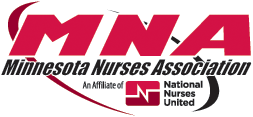Session Ends
The House adjourned in the wee hours of Thursday morning, and the Senate followed suit on Thursday afternoon. This session, we saw more involvement from MNA nurses on legislative issues than at any other time in recent MNA history. Everyone who reached out to their elected officials, educated their colleagues about the issues, or came to the Capitol should feel proud. Nurses are a respected and influential force at the Capitol because of all of your work.
MNA Priorities
- Right to Work: DEFEATED. The tremendous outpouring of opposition from nurses and fellow union members influenced enough DFL and Republican legislators to stop the Right to Work amendment from making it through the legislative process. Despite multiple attempts by proponents from the beginning of session to the very end to pass this amendment, union members and our allies stood together and spoke with one voice about this unfair, unsafe and unnecessary legislation to tip the scales in favor of big corporations and against working people.
- National Nurse Licensure Compact: DEFEATED. Despite making it through the legislative process, the House and Senate adjourned before taking a final vote on the Compact. Due to overwhelming advocacy from nurses and other labor allies, Governor Dayton indicated to MNA that he would veto the bill, but it never came to his desk. Thanks to the AFL-CIO and unions including UFCW 653, IBEW State Council, AFSCME Council 5 and MAPE for opposing this attempt to dilute standards and privatize professional licensing. The Compact will most likely come back next session, but for now, be proud of all the calls, emails, letters and visits that nurses made to stop this attempt to lower Minnesota’s nursing standards, making patients less safe, and making it harder for nurses to organize a union and negotiate a fair contract.
- Felony Neglect of Vulnerable Adult: SIGNED INTO LAW. MNA worked with the authors of this
bill to craft first-in-the-nation legislation that protects both vulnerable adults and health care workers. Unlike every other state that punishes neglect of a vulnerable adult as a felony, the new Minnesota law includes language protecting nurses and other health care workers from punishment for neglect that was due to circumstances outside their control, such as unsafe staffing levels. Minnesota is the first state ever to use unsafe staffing levels as an affirmative defense. - HMO Transparency: ONGOING. While no bills made it through the legislative process, MNA and our allies continued asking hard questions about the nearly $4 billion a year that HMOs receive to administer public health care programs. As a result, the federal government started an investigation and held hearings in Washington, DC to determine if our state Medicaid program is overpaying these insurance companies. MNA will continue to push for transparency, including third party audits, so taxpayers can finally learn how much of this money goes to provide actual health care, and what goes to insurance company profits.
- Safe Staffing Bill: REINTRODUCED. After years of broken promises from hospitals to work directly with nurses to address patient safety issues that resulted from inadequate staffing, MNA nurses introduced legislation with the bipartisan support of authors Rep. Larry Howes (R) and Sen. Jeff Hayden (DFL). The 2012 Staffing for Patient Safety Act includes setting a maximum patient assignment for Registered Nurses based on factors including nursing intensity and patient acuity, and would require hospital administrators to work directly with nurses to ensure that adequate resources are provided to keep patients safe. We will continue to pursue safe staffing at the Capitol, as well as at the bargaining table and at the bedside.
- Budget Amendments: DEFEATED. Proposed constitutional amendments that would have made it nearly impossible for future legislatures to raise revenue and would have created even more budgetary gimmicks and gridlock, never made it through the legislative process. Early in the session, MNA nurses lobbied legislators against these proposals at our Day on the Hill. It is the legislators’ job to create a budget, and we believe they need to do the job they were elected to do.
- Willmar CTS: REMAINS OPEN. As part of last session’s budget cuts, the Willmar state mental health facility was slated for closure this spring. Due to the work of MNA nurses as well as our labor allies and Willmar legislators, the legislature included funding in the Health and Human Services bill to keep this much-needed facility open for another year, giving lawmakers and the Department of Human Services more time to find a permanent solution.
- RN Criminal Background Checks: ONGOING. There were multiple attempts to change the way background checks are performed for nurses and other health professionals.
- The Minnesota Board of Nursing’s changes to Registered Nurse criminal background checks, Senate File 1053, was laid on the table in the Senate Judiciary Committee and missed the legislative deadline to continue on through the process. MNA provided testimony that raised a lot of questions and concerns about this duplicative and costly that relied on a flawed system of fingerprinting by the federal government. MNA will continue to work with the MBON to find a compromise that continues to protect patient safety while preserving the rights of nurses.
- The legislature required health licensing boards and the Commissioner of Health to jointly study and make recommendations for establishing uniform criminal history background check requirements for health professionals.
- In order to provide greater transparency to the public, the legislature required each health-related licensing board and the Commissioner of Health to post on their websites the name and business address of health professionals who have 1) been convicted of a felony or gross misdemeanor occurring on or after July 1, 2013 2) a malpractice judgment occurring on or after July 1, 2013, in any jurisdiction or 3) any disciplinary or corrective action or restriction of privileges taken by a licensing board in any jurisdiction. MNA and the Minnesota Medical Association successfully lobbied for language affirming that this requirement is not intended to report any health professional who self-reports to the Health Professionals Service Program (HPSP).
- We support criminal background checks as an important and necessary tool to ensure patient safety, and MNA has introduced a new bill that would improve patient safety while protecting the rights of nurses and improving the accuracy of criminal background checks.
- Omnibus Pension Bill: SIGNED INTO LAW. MNA members expressed concerns about this bill’s attempt to better secure the future of state pensions by decreasing potential benefits. Ultimately, the change was made to include a five year study, leaving open the possibility of returning benefits to current levels after five years. In addition, MNA worked with Sen. Julie Rosen to include a provision that resulted in employees at public facilities considering privatization, like Virginia Regional Medical Center, no longer losing out on inflationary increases to their pension accounts from the time of privatization until their retirement.
- Sunset Commission: SIGNED INTO LAW. In an effort to decrease the size of government, the 2011 legislature created a task force to review all state departments and boards, including the Minnesota Board of Nursing. While we don’t always agree with everything the MN BON does, we do believe it is better to be regulated under the BON rather than another department, therefore MNA testified in support of maintaining the Board of Nursing.
- Bonding Bill and Vikings Stadium: SIGNED INTO LAW. Both of these bills were high priorities for the AFL-CIO and our brothers and sisters in the building trades and hospitality industry. Both the bonding bill – which will fund building and renovation projects for roads, bridges, public universities and other state assets – and the stadium bill will create good-paying jobs that will help our economy recover.
- Nursing Scope of Practice: ONGOING. While no legislation was introduced this session, the Board of Nursing is proposing changes to the Nurse Practice Act that we expect to see in the next legislative session. Their proposal includes expanding the LPN scope of practice to include assessment and delegation. Public “listening sessions” are being held all over the state this spring and summer to seek opinions on this proposal. It’s critical that nurses attend these sessions and voice their concerns with this proposal. Please click here for more information.
Bipartisan Alliances
We always say that nurses’ priorities are non-partisan. And this session that was more true than ever before. MNA members built and strengthened relationships with legislators on both sides of the aisle, especially related to the issues of Right to Work and HMO accountability. MNA members of both parties reached out and connected with legislators of both parties, which made us more effective and
Onward to the Election!
The session is over, but our work is not done. If we want to stop playing defense on bad legislation like Right to Work and the Compact, and start playing offense on policies that will improve nurse staffing and increase access to affordable health care, we must focus on electing candidates who will support and champion nurses’ priorities and values.
Regional Action Councils in every corner of the state are starting to consider candidates for MNA’s endorsement and will go on to mobilize nurses to help get our endorsed candidates elected. There is no partisan litmus-test for MNA’s endorsement. We have endorsed Democrats and Republicans who support nurses If you would like to participate or learn more about the Regional Action Councils, please contact the MNA Political Organizer who works in your region:
Grant Bendix, Northern Minnesota Political and Community Organizer, 651-414-2830
Geri Katz, Metro Area Political and Community Organizer, 651-414-2855
Julia Donnelly, Southern Minnesota Political and Community Organizer, 651-414-2833

